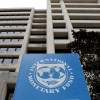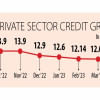IMF defends revising down GDP forecast

International Monetary Fund (IMF) has defended revising down its forecast for Bangladesh's GDP growth in fiscal year 2023-24, saying it was "pretty reasonable" amidst various ongoing challenges, including elevated inflation.
The revised prediction was 6 percent in the United Nations financial agency's "World Economic Outlook" published on October 10.
However, its April edition had projected it to be 6.5 percent.
Bangladesh has elevated commodity prices, a slowdown in external demand, and global monetary tightening, which continues, said Krishna Srinivasan, director of the Asia and Pacific Department.
All these factors continue to weigh on Bangladesh's growth, he said in response to a journalist's question at a press briefing organised by the IMF in Morocco on Friday on the Asia and Pacific Region's Economic Outlook.
"And that's why we have growth at 6 percent in FY '24, unchanged from FY '23," a transcript of the press briefing quoted him as saying.
Regarding the Bangladesh government's target of 7.5 percent, he said, "It's not very uncommon for the countries to have a higher growth number than us."
"Now, Bangladesh has taken significant measures to address the macroeconomic challenges," said Srinivasan.
It is important to distinguish between macro stability objectives and growth objectives. The country has tightened its monetary policy stance to reduce inflation and allowed more flexible exchange rates while unifying the exchange rate system, he said.
And, the government has kept a prudent fiscal policy and reprioritised spending to support the poor and vulnerable, he added.
"So, at this point in time, the effort is going towards macro stability. A 5 percent growth in that context is pretty reasonable," said Srinivasan.
Now, going forward, Bangladesh has significant growth potential, he said.
With favourable demographics, once Bangladesh overcomes the crisis and addresses reforms through a full programme, it is well placed to reach middle-income status, he explained.
"…for Bangladesh, one of the key objectives is to raise revenues to support both the development objectives and to support infrastructure needs…which will also boost the productive potential of the economy," said Srinivasan.
Enhancing revenue generation was one of the conditions tagged with an IMF loan of $4.7 billion. A part of it was to collect Tk 3.45 crore in taxes in fiscal year 2022-23, which could not be attained.
In the current fiscal year, the government has to collect an additional revenue of 0.5 percent of GDP. An IMF delegation is currently in Bangladesh to review the performance in achieving such targets related to the loan.
"So overall, I think, the economy is off on the good track in terms of meeting the objectives of the programme, getting inflation under control, addressing the macro challenges given a very difficult global environment," the transcript quoted Srinivasan as saying.

 For all latest news, follow The Daily Star's Google News channel.
For all latest news, follow The Daily Star's Google News channel. 








Comments